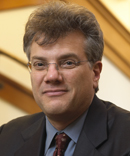- Richard Pildes
Infobox Scientist
box_width = 250px
name = Richard H. Pildes
image_size = 200px
caption =
birth_date = 1957
birth_place = Chicago, Illinois
death_date =
death_place =
residence =
citizenship =
nationality = flag|United States
ethnicity =
fields =Constitutional Law
workplaces =New York University School of Law
alma_mater =Princeton University Harvard Law School
doctoral_advisor =
academic_advisors =
doctoral_students =
notable_students =
known_for =
influences =
influenced =
awards =
religion =
footnotes =Richard H. Pildes (born 1957) is a law professor at the
New York University School of Law , a leading expert onelection law , and apublic intellectual . He is one of the nation's leading scholars ofpublic law and a specialist in legal issues affectingdemocracy .The son of two
Chicago -area physicians, Pildes received his A.B., "summa cum laude", in physical chemistry from Princeton in 1979, and hisJ.D. , "magna cum laude", from Harvard in 1983. He clerked for JudgeAbner J. Mikva of theU.S. Court of Appeals for the District of Columbia and for JusticeThurgood Marshall of theU.S. Supreme Court (where he clerked alongside future colleague and NYU Law DeanRichard Revesz ), after which he practiced law in Boston. He began his academic career at theUniversity of Michigan Law School , where he was assistant and then full professor of law from 1988 until 1999, when he joined the NYU School of Law faculty. He has been a visiting professor at theUniversity of Chicago Law School , Harvard Law School, theUniversity of Texas Law School .In the area of democracy, Pildes, along with the co-authors of his widely-used casebook, The Law of Democracy, has helped to create a new field of study in the law schools. Pildes is a leading scholar on the topics of the
Voting Rights Act , alternative voting systems (such ascumulative voting ), the history ofdisfranchisement in the United States, and the general relationship between constitutional law and democratic politics in the design of democratic institutions themselves. His work in these areas has been frequently cited in United States Supreme Court opinions.Pildes gives frequent public lectures and appearances, and was nominated for an
Emmy Award for his legal analysis during the2000 Presidential election litigation. During the 2000 Presidential election controversy, he had an exclusive media contract withNBC and appeared frequently onNBC Nightly News withTom Brokaw ,MSNBC , andWNBC-TV . He is also an active public intellectual and public-law litigator. He has written forThe New York Times ,The Wall Street Journal ,The New Republic , The American Prospect, and other such publications. Apart from his academic work, Pildes has also served as a federal court-appointed independent expert on voting rights litigation, an assistant to a special master for the redistricting of a state legislature, and has worked with the State ofNorth Carolina in redistricting litigation before the United States Supreme Court.Representative Bibliography
*"The Law of Democracy: Legal Structure of the Political Process" with
Pamela S. Karlan ,Samuel Issacharoff . 2nd ed. (2001).
*"When Elections Go Bad: The Law of Democracy and the Presidential Election of 2000" withPamela S. Karlan ,Samuel Issacharoff . Rev. ed. (2001).
*"The Future of the Voting Rights Act" with David Epstein, Rodolfo de la Garza and Sharyn O'Halloran.
*"Separation of Parties, Not Powers." with Daryl Levinson. 119 "Harvard Law Review" 2311 (2006).
*"The Supreme Court, 2003 Term- Foreword: The Constitutionalization of Democratic Politics." 118 "Harvard Law Review" 29 (2004).
*"Democrats and Technocrats," withCass Sunstein . "Journees d'etudes juridiques Jean Dabin" (2004).
*"Competitive, Deliberative, and Rights-Oriented Democracy," 3 "Election Law Journal" 685 (2004).External Links and Sources
* [http://its.law.nyu.edu/faculty/profiles/index.cfm?fuseaction=bio.main&personID=20200 NYU School of Law Faculty Page]
* [http://query.nytimes.com/gst/fullpage.html?res=9F00E2DF133DF933A05752C1A9669C8B63&sec=&spon=&pagewanted=1 New York Times Profile]
* [http://its.law.nyu.edu/faculty/profiles/CVFiles/pildesvitacrn.pdf Full CV]
* [http://papers.ssrn.com/sol3/results.cfm?RequestTimeout=50000000 Social Science Research Network (SSRN) Publications Page]
* [http://pview.findlaw.com/view/3348766_1?channel=LP Litigation History from Findlaw (Requires Registration)]
Wikimedia Foundation. 2010.
